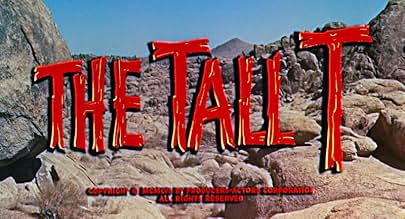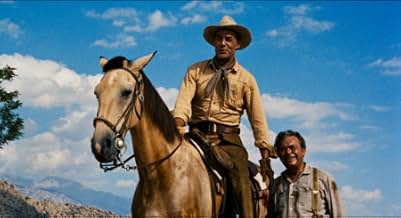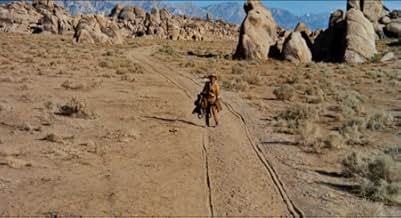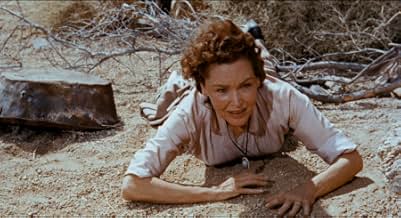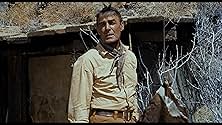IMDb RATING
7.3/10
6.7K
YOUR RATING
An independent former ranch foreman is kidnapped along with an heiress, who is being held for ransom by trio of ruthless outlaws.An independent former ranch foreman is kidnapped along with an heiress, who is being held for ransom by trio of ruthless outlaws.An independent former ranch foreman is kidnapped along with an heiress, who is being held for ransom by trio of ruthless outlaws.
- Director
- Writers
- Stars
- Awards
- 1 win total
Robert Anderson
- Jace
- (uncredited)
Dick Johnstone
- Townsman
- (uncredited)
Anne Kunde
- Townswoman
- (uncredited)
Christopher Olsen
- Jeff
- (uncredited)
Fred Sherman
- Hank Parker
- (uncredited)
- Director
- Writers
- All cast & crew
- Production, box office & more at IMDbPro
Featured reviews
8fs3
Boetticher and Scott spent the latter half of the 1950s making some terrific, adult, low-key Westerns, of which this stands as the best. Atmosphere, technical work and acting are all excellent, with interesting villain characterizations and a well-realized flawed hero in Scott.
Brutal and vivid, great-looking, and among Elmore Leonard's earliest writing work in the medium. Check out this classic, as well as the other films of the star and director (also the similar, excellent Gary Cooper/Anthony Mann teaming in the following year's Man of the West.)
Brutal and vivid, great-looking, and among Elmore Leonard's earliest writing work in the medium. Check out this classic, as well as the other films of the star and director (also the similar, excellent Gary Cooper/Anthony Mann teaming in the following year's Man of the West.)
10lwetzel
**** I never really figured out what the Tall T exactly was. It doesn't matter. This is a great film and an outstanding western. The actors are all good, especially Randolph Scott as a western everyman (I always want to repeat the "Blazing Saddles" homage to Scott whenever I say his name)and Richard Boone as one of the most evil bad men in western film history. Skip Homeier and Henry Silva give great performances as two young guns who are teamed up with Boone. They are sexy and evil at once. The dialogue is biting, the situations are adult and dramatic, the scenery is superb, and the music complements the film's tension to a Tall T.
SPOILERS.
If you're attracted only to black-and-white dramas shot in the rain in Slovenia, you probably won't like this one.
It's a no-nonsense El Cheapo Western shot on a low budget, an elementary piece of exposition of masculine honor, with Boetticher, Scott, Kennedy, Richard Boone, and movie flats -- all at the top of their forms.
What distinguishes the half-dozen or so Westerns that came from Boetticher and Scott is not so much the plot, which is generally simple, but the slight twists in character and the occasional grace notes in the dialogue.
You have to love this dialogue. "Cookin'? That's WIMMIN's work!" And, said by Scott in all sincerity, "There are some things a man can't ride around." And, "There are ten head of wimmin for every man in Sonora. Course, most of them is just hurrah gals." And, "I'm not gonna get shot in the belly just 'cause you're feelin' sorry for yourself." And, "Why don't you just say it out in words?"
Basically the story has Scott and O'Sullivan (who, twenty years earlier had been Tarzan's delectable mate) held hostage by Boone and his two shallow young companions, Billy Jack (Skip Homeier) and Chink (Henry Silva). Boone, although a vicious murderer, is not entirely unsympathetic. He feels forced to "run with" these coarse companeros who live from moment to moment. They don't even know their own ages. They've been beaten and mistreated since they were kids. ("You run with them," says Scott reprovingly.) Boone, on the other hand, is sick of their talk about wimmin and such. He is lonely, has no family or wummin waiting for him. "Talk," he orders Scott at gunpoint, "about anything!" He dreams of someday having a spread of his own, with a couple of cattle, working the ground.
But the code -- I mean the movie code of the 1950s, not the Western code -- is an unforgiving one. He is, after all, a murderer. When O'Sullivan's cowardly new husband is given permission to ride off to freedom and desert his wife, Boone turns away and mutters, "Bust him, Chink." The coward's name is Willard Mimms -- Arthur Honeycutt draws out the vowel and imposes a dipthong on it when he pronounces the name -- "Mee-yums." We know Mimms is toast five seconds after we meet him.
Richard Boone is great as the heavy with the daydreams. In a particularly violent climax he is blinded by a shotgun, twirls around entangled in a burlap sheet, and collapses. Scott shows his range in this movie. He laughs at the beginning and becomes grim after being taken hostage. He even forcefully smothers O'Sullivan in passionate kisses. And I thought he only like horses and mules. Commanding too is the performance of Henry Silva, in pink shirt and suspenders. He's clever, the way a sewer rat is clever. He slouches when he walks, and he stands hipshot. His expression hardly ever varies. And his voice is matter of fact, even when he's eagerly anticipating dumping yet another body in the well.
It's quite a lot of fun, shot as it is in Movie Flats. That's Mount Whitney in the background, the highest peak in California's Sierra Nevada. The highest peak in the lower 48 for that matter.
If you're attracted only to black-and-white dramas shot in the rain in Slovenia, you probably won't like this one.
It's a no-nonsense El Cheapo Western shot on a low budget, an elementary piece of exposition of masculine honor, with Boetticher, Scott, Kennedy, Richard Boone, and movie flats -- all at the top of their forms.
What distinguishes the half-dozen or so Westerns that came from Boetticher and Scott is not so much the plot, which is generally simple, but the slight twists in character and the occasional grace notes in the dialogue.
You have to love this dialogue. "Cookin'? That's WIMMIN's work!" And, said by Scott in all sincerity, "There are some things a man can't ride around." And, "There are ten head of wimmin for every man in Sonora. Course, most of them is just hurrah gals." And, "I'm not gonna get shot in the belly just 'cause you're feelin' sorry for yourself." And, "Why don't you just say it out in words?"
Basically the story has Scott and O'Sullivan (who, twenty years earlier had been Tarzan's delectable mate) held hostage by Boone and his two shallow young companions, Billy Jack (Skip Homeier) and Chink (Henry Silva). Boone, although a vicious murderer, is not entirely unsympathetic. He feels forced to "run with" these coarse companeros who live from moment to moment. They don't even know their own ages. They've been beaten and mistreated since they were kids. ("You run with them," says Scott reprovingly.) Boone, on the other hand, is sick of their talk about wimmin and such. He is lonely, has no family or wummin waiting for him. "Talk," he orders Scott at gunpoint, "about anything!" He dreams of someday having a spread of his own, with a couple of cattle, working the ground.
But the code -- I mean the movie code of the 1950s, not the Western code -- is an unforgiving one. He is, after all, a murderer. When O'Sullivan's cowardly new husband is given permission to ride off to freedom and desert his wife, Boone turns away and mutters, "Bust him, Chink." The coward's name is Willard Mimms -- Arthur Honeycutt draws out the vowel and imposes a dipthong on it when he pronounces the name -- "Mee-yums." We know Mimms is toast five seconds after we meet him.
Richard Boone is great as the heavy with the daydreams. In a particularly violent climax he is blinded by a shotgun, twirls around entangled in a burlap sheet, and collapses. Scott shows his range in this movie. He laughs at the beginning and becomes grim after being taken hostage. He even forcefully smothers O'Sullivan in passionate kisses. And I thought he only like horses and mules. Commanding too is the performance of Henry Silva, in pink shirt and suspenders. He's clever, the way a sewer rat is clever. He slouches when he walks, and he stands hipshot. His expression hardly ever varies. And his voice is matter of fact, even when he's eagerly anticipating dumping yet another body in the well.
It's quite a lot of fun, shot as it is in Movie Flats. That's Mount Whitney in the background, the highest peak in California's Sierra Nevada. The highest peak in the lower 48 for that matter.
Very good Western about a rough confrontation with strong characterization. Compelling tale of a cowboy , Randolph Scott , and his nemesis, Richard Boone, and hoodlums , Skip Homeier and Henry Silva . In the Old west there are always the men who live breathe violence and the women who hold their breath . Having lost his horse in a wager , a hard-bitten man named Brennan (Scott) takes a stagecoach driven by his friend Ed (Arthur Hunnicutt) . Ed is carrying newlyweds , Willard (John Hubbard) and Doretta (Maureen O'Sullivan). At the next station the stagecoach and its passengers are kidnapped by a trio of gunfighters ( Homeier , Silva) led by a villain named Usher (Richard Boone). When Usher aware that Doretta is the daughter of a rich copper-mine owner, he decides to obtain a ransom but the events get worse.
This is a tremendously exciting story of a drifter who helps newlyweds and falls in love with the recent wife . It begins as a sluggish , slow-moving Western but follows to surprise us with dark , complex characters and solid plot . The simple tale is almost rudimentary though full of clichés, a good guy come to free newlyweds just in time to get the woman . Suspense and tension builds over the time in which the outlaws and the starring await a response to their demands . The action is brutishly cruel as when the nasties shoot without remission. The highlights of the film are the facing off between Scott and his enemies and the climatic showdown on the ending . Phenomenal and great role for Randolph Scott as tough guy , he's the whole show. He play perfectly as stoic, craggy, and uncompromising figure .Vivid and atmospheric musical score by Heinz Roemhelz and colorful cinematography reflecting marvelously the rocky,stony scenarios by Charles Lawton Jr . Watchable results for this offbeat Western.
The motion picture is stunningly directed by Budd Boetticher in bleak style . Boetticher formed a production company called ¨Ranown¨ along with Harry Joe Brown and Randolph Scott and as usual writer Burt Kennedy. The first Harrry Brown-Boetticher-Scott movie was 1956's " Seven men from now" , following ¨Decision at sundown(57)¨, ¨Buchanan rides alone(58)¨,¨Westbound(59)¨ ,¨Ride lonesome(59) ,in the decades since, they have produced and directed one Western ¨Comanche Station(60)¨ . Boetticher was a great expert on Western genre and also on the bullfighting world as ¨Bullfighter and the lady¨, ¨The magnificent matador¨ and ¨Arruza¨ . Rating : Above average. Well worth watching .
This is a tremendously exciting story of a drifter who helps newlyweds and falls in love with the recent wife . It begins as a sluggish , slow-moving Western but follows to surprise us with dark , complex characters and solid plot . The simple tale is almost rudimentary though full of clichés, a good guy come to free newlyweds just in time to get the woman . Suspense and tension builds over the time in which the outlaws and the starring await a response to their demands . The action is brutishly cruel as when the nasties shoot without remission. The highlights of the film are the facing off between Scott and his enemies and the climatic showdown on the ending . Phenomenal and great role for Randolph Scott as tough guy , he's the whole show. He play perfectly as stoic, craggy, and uncompromising figure .Vivid and atmospheric musical score by Heinz Roemhelz and colorful cinematography reflecting marvelously the rocky,stony scenarios by Charles Lawton Jr . Watchable results for this offbeat Western.
The motion picture is stunningly directed by Budd Boetticher in bleak style . Boetticher formed a production company called ¨Ranown¨ along with Harry Joe Brown and Randolph Scott and as usual writer Burt Kennedy. The first Harrry Brown-Boetticher-Scott movie was 1956's " Seven men from now" , following ¨Decision at sundown(57)¨, ¨Buchanan rides alone(58)¨,¨Westbound(59)¨ ,¨Ride lonesome(59) ,in the decades since, they have produced and directed one Western ¨Comanche Station(60)¨ . Boetticher was a great expert on Western genre and also on the bullfighting world as ¨Bullfighter and the lady¨, ¨The magnificent matador¨ and ¨Arruza¨ . Rating : Above average. Well worth watching .
Borrowing elements from Stagecoach and Rawhide, The Tall T is one lean and mean collaboration from director Budd Boetticher and star Randolph Scott. It's one of the best of the seven films the two men did together in the Fifties.
Scott's lost a horse on a bet with his old boss Robert Burton and is walking back to his place, a good 15 miles carrying saddle and other western gear. A stagecoach stops and driver Arthur Hunnicutt offers him a lift. It's not the regular stagecoach run, it's been hired by John Hubbard for him and his wife Maureen O'Sullivan. She's the only child of a millionaire mine owner and Hubbard was the bookkeeper for her father. It's made quite obvious from the beginning this is not a love match.
When the stagecoach gets to a way station, it's been taken over by outlaws Richard Boone, Skip Homeier, and Henry Silva. They think it's the regular coach run, but when they hear how O'Sullivan's father is worth millions, they decide on a kidnap.
The T in The Tall T might just stand for tension because that's what the film bristles with. Once Scott, O'Sullivan, and Hubbard are taken prisoner, the film's suspense doesn't let up for a minute. Scott is at his most forthright as a western hero in The Tall T.
Homeier and Silva play their usual punk roles to perfection. Boone is lean and mean as their leader, a worthy adversary for Scott. Of course it's the other two with their more than human weaknesses that leads to their downfall.
The Tall T is one of the best of Randolph Scott's westerns required viewing if one calls thyself a Randolph Scott fan.
Scott's lost a horse on a bet with his old boss Robert Burton and is walking back to his place, a good 15 miles carrying saddle and other western gear. A stagecoach stops and driver Arthur Hunnicutt offers him a lift. It's not the regular stagecoach run, it's been hired by John Hubbard for him and his wife Maureen O'Sullivan. She's the only child of a millionaire mine owner and Hubbard was the bookkeeper for her father. It's made quite obvious from the beginning this is not a love match.
When the stagecoach gets to a way station, it's been taken over by outlaws Richard Boone, Skip Homeier, and Henry Silva. They think it's the regular coach run, but when they hear how O'Sullivan's father is worth millions, they decide on a kidnap.
The T in The Tall T might just stand for tension because that's what the film bristles with. Once Scott, O'Sullivan, and Hubbard are taken prisoner, the film's suspense doesn't let up for a minute. Scott is at his most forthright as a western hero in The Tall T.
Homeier and Silva play their usual punk roles to perfection. Boone is lean and mean as their leader, a worthy adversary for Scott. Of course it's the other two with their more than human weaknesses that leads to their downfall.
The Tall T is one of the best of Randolph Scott's westerns required viewing if one calls thyself a Randolph Scott fan.
Did you know
- TriviaAlthough playing the older man, Arthur Hunnicutt was in reality twelve years younger than Randolph Scott.
- GoofsAs Brennan rides into town, after the meeting with the station keeper and his son, he passes the stage, which is standing in the street. Behind the stage, in the street behind, there is a parked car.
- Quotes
[last lines]
[Pat, to the weeping Doretta, after he has killed three murderous kidnappers]
Pat Brennan: Come on now. It's gonna be a nice day.
- How long is The Tall T?Powered by Alexa
Details
- Runtime1 hour 18 minutes
Contribute to this page
Suggest an edit or add missing content



